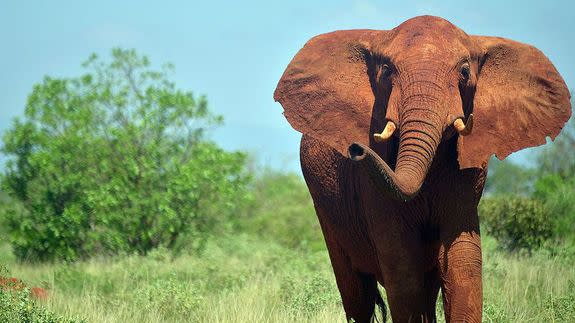U.S. announces groundbreaking ban on illegal trade of elephant ivory

Trading illegal ivory in the U.S. just got a whole lot trickier, thanks to a new federal rule from the Obama administration.
The U.S. Fish and Wildlife Service announced on Thursday a new rule under the Endangered Species Act, instituting a near-total ban on the domestic commercial trade of African elephant ivory in an effort to protect the severely endangered animals.
SEE ALSO: Gripping photos capture the beauty and plight of the world's elephants
The regulation restricts all ivory sales to lawfully imported antiques that are at least one century old, and to items like musical instruments and firearms that were made using less than 200 grams — or less than half a pound — of ivory. Under the previous version of the act, ivory could be traded if it had been brought into the U.S. before 1978, when African elephants were first listed as endangered, or if the elephant died of natural causes. Both cases required official documentation.
But the U.S. Fish and Wildlife Service said it was nearly impossible to distinguish illegal ivory from legal ivory under previous conservation law, limiting the effectiveness of enforcement. The new rule, which was first proposed in 2015 and finalized Thursday, will provide federal agents with clearer guidelines in identifying illegal ivory.
"Today's bold action underscores the United States' leadership and commitment to ending the scourge of elephant poaching and the tragic impact it's having on wild populations," U.S. Secretary of the Interior Sally Jewell, who also serves as co-chair of the President's Task Force on Wildlife Trafficking, said in a release.
"We hope other nations will act quickly and decisively to stop the flow of blood ivory by implementing similar regulations, which are crucial to ensuring our grandchildren and their children know these iconic species," Jewell said.
The ban echoes intentions from China and several African nations, which have taken similar steps to battle illegal poaching and trade. Many conservation organizations, such as the Wildlife Conservation Society (WCS), say that if all nations took similar action, it could dramatically reverse the decline of African elephant populations.
The WCS — which founded the 96 Elephants campaign, an effort to curb poaching and push for stricter U.S. poaching regulations — applauded the move as a strong statement to poachers around the globe.
"The USA is shutting down the bloody ivory market that is wiping out Africa's elephants,” Cristián Samper, president and CEO of WCS, said in a statement. "The USA is boldly saying to ivory poachers, 'You are officially out of business.'"

Image: Lili sams/mashable
Between 2010 and 2012, 100,000 African elephants were illegally killed for their ivory in the continent — an average of 96 elephants per day, or one every 15 minutes.
Currently, there’s estimated to be 470,000 African elephants alive worldwide.
The new rule announced Thursday follows restrictions outlined under President Obama's 2013 Executive Order on Combating Wildlife Trafficking, in which he named the illegal trade and poaching of wildlife an international crisis, and vowed to reduce the trafficking of poached goods.
The announcement also comes after highly visible displays of activism from conservations groups over the past year. In June 2015, a mass demonstration in Times Square by federal officials and conservationists resulted in the crushing of more than 1 ton of ivory. In April, Kenya burned 105 tons of elephant tusks to protest poaching — the largest demonstration against illicit trade in history.
The World Wildlife Fund announced this week that the population of Tanzania's largest elephant reserve could be wiped out within six years due to poaching. The Selous Game Reserve had a massive population of 110,000 elephants just 40 years ago. Now, it has about 15,000.
"Our actions close a major avenue to wildlife traffickers by removing the cover that legal ivory trade provides to the illegal trade," said Dan Ashe, director of the U.S. Fish and Wildlife Service.
"We still have much to do to save this species, but today is a good day for the African elephant."
